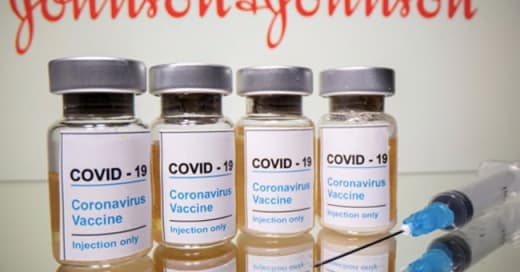This week, we’re covering the news that everyone has been talking about — the pause on the Johnson and Johnson COVID-19 vaccine. We’ll explain what happened, why, and what the impact might be on the future vaccination effort.
Today’s Pulse is 900 words, or a 7 minute read.
If you like what you read, make sure to drag the email to your “primary” tab!
COVID-19 VaccinesJ&J COVID-19 Vaccine Remains on Hold
The pulse:
Earlier this week, the CDC recommended a pause on the recently authorized Johnson and Johnson COVID-19 vaccine. You can slide back from the edge of your seat now, because it looks like that pause will continue for at least another week.
Why the pause?
As you might have heard, the CDC wants to further investigate a possible link between the J&J vaccine and a rare blood clot in the brain called cerebral venous sinus thrombosis. There were six such cases identified in the approximately 7 million individuals vaccinated with J&J’s single dose vaccine. Three of the women had large clots in other parts of their bodies as well, particularly the abdomen. The median time from vaccination to symptom onset was 9 days (range 6-13 days) and all cases were in women ages 18-48. One patient died.
There’s something unusual that makes these cases perplexing — in addition to presenting with cerebral venous sinus thrombosis, these patients all had low platelets (a condition called thrombocytopenia). Platelets are cells in our blood that are important for blood clotting. It’s not readily apparent why the J&J vaccine could be leading to thrombocytopenia and blood clots.
I’m getting a sense of deja vu, and not just because Olivia Rodrigo is playing in the background.
That might be because the AstraZeneca COVID-19 vaccine has been in the news for an almost identical issue. Both AstraZeneca and J&J’s vaccines are adenovirus vector vaccines, meaning they rely on a modified version of a different, harmless virus (not SARS-CoV-2) to bring vaccine components into the cell. Once inside the cell, the vaccine produces a harmless piece of the SARS-CoV-2 virus so that the immune system can recognize the virus and produce a response, leading to protection from future infection.
This is in contrast to the Pfizer and Moderna vaccines, which rely on mRNA technology (see our Past Pulse for an in depth explanation of mRNA vaccines). Unusual blood clotting events have not been similarly tied to either of the mRNA vaccines. It’s not entirely clear why these adenovirus based COVID-19 vaccines seem to carry more risk than their mRNA counterparts, but studies from individuals who received the AstraZeneca vaccines are helping to elucidate more of the biology behind the unusual vaccine reaction.
Source: NDTV
Is an immune reaction to blame?
Patients who ended up with thrombocytopenia after receiving the AstraZeneca vaccine seemed to have high levels of an antibody against platelet factor 4 (PF4). Anti-PF4 is a molecule that activates platelets, causing them to bind to one another to help form a blood clot. When these platelets start clotting, they get used up, causing a low platelet count in the blood. Researchers believe the six women who ended up with cerebral venous sinus thrombosis after receiving the J&J vaccine likely also had high levels of antibodies against PF4.
One working theory is that these two adenoviral based vaccines may for some reason trigger the immune system to produce antibodies against PF4. This sets off a clotting pathway that explains the low platelet count and increased risk of clots in the brain and elsewhere. Importantly, this condition (unlike many clotting diseases) should not be treated with heparin, a widely used blood thinner, and other treatments should be considered.
While much remains unknown about the initial trigger, scientists are working rapidly to try and further understand the link between this clotting pathway and both the J&J and AstraZeneca vaccines.
Impact of a Pause
In terms of supply, this pause surprisingly may not have much of an impact in the US. Pfizer and Moderna have been supplying the lion’s share of vaccines to Americans; under 6% of Americans have received the J&J vaccine so far. The White House has said the pause will not affect vaccine rollout, and that the US is still on track to make all adults eligible for the vaccine by April 19th.
The bigger blow, of course, is the psychological one. Vaccine experts fear that the pause will weaken public support for vaccine efforts and cause individuals to reject other COVID-19 vaccines as well. This week, thousands of Americans across the country cancelled vaccination appointments for both the Pfizer and Moderna vaccines.
There are also global ramifications. When the CDC talks, it’s often not just the US that listens. South Africa has suspended use of the J&J vaccine and Australia announced it will not be purchasing any doses of J&J. The EU, which has been dealing with the fallout from the AstraZeneca-Oxford vaccine, has also delayed the J&J rollout.
Bottom line it for me:
An immune reaction to the J&J COVID-19 vaccine may explain six rare incidences of blood clots following vaccination. The CDC’s recommendation to pause vaccine roll out is a good one considering how little we know, but is also likely to dampen public support for all COVID-19 vaccines.





